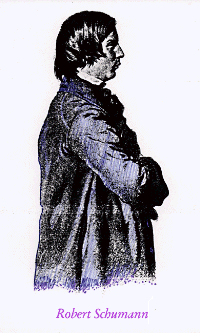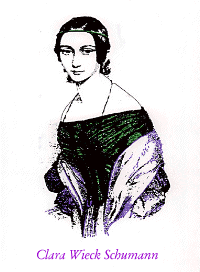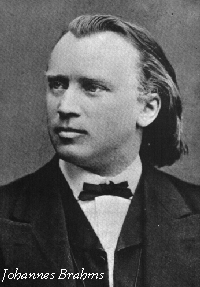|
THE MARCH OF THE DAVIDSBÜNDLER AGAINST THE PHILISTINES
"The laws of morality are also those of art" - Robert Schumann
The following is the story of a group of composers who led a spirited, if unsuccessful, battle to defend the tradition of classical music composition, during the 19th Century. The intellectual leadership was provided by the composer Robert Schumann, who also wrote for and edited a journal of music criticism, the Neue Zeitschrift für Musik (New Journal for Music). In declaring the purpose of his journal, Schumann wrote:
Schumann used his journal as a weapon against the banal and empty theatrical and virtuoso-compositions which were then popular. It chafed him no end that so soon after the deaths of Beethoven and Schubert, the public taste had been won by the likes of Rossini. In a review of a performance of Beethoven's four overtures to Fidelio, Schumann wrote: "To the multitude it is, of course, a matter of indifference whether Beethoven wrote four overtures to a single opera or whether Rossini equipped four operas with a single overture." Schumann's journal was born of a desire to organize musicians to fight in defense of music: "There is a "School of Politeness" (by Rumohr); I wonder that nobody has ever thought of writing a "School of Polemics," which would be much richer in ideas... Nowadays, combat too often becomes inevitable. Musical polemics still present a wide field, because few musicians know how to write well, and few authors are practical musicians, neither party knowing how to take hold of the matter; consequently, musical controversies often end with a retreat on both sides or a general embrace. If only the right people would enter the field -- those who know how to fight!" However, as Schumann was pulling together his troops to combat silly theatre-music and vain displays of technical prowess, a much more dangerous foe was massing his forces on the horizon: the "Music of the Future," whose chief proponents were Liszt and Wagner. These sought to destroy music as a language of poetic ideas, the most efficient language with which to make the process of human creativity conscious for the listener, and instead made music the language of Eros -- of powerfully irrational sensual effects. In doing so they were attacking the very fundamentals of musical composition, and opening the door to the horrors of twentieth century music. Schumann, in defense of music's fundamentals, invoked the greatest of poets, Bach and Beethoven: "We yet need a publication to defend the 'music of the future.' Only such men as the late blind cantor of the Thomas School and the deaf conductor who lies in Vienna could aptly edit it." Liszt and Wagner counterattacked against Beethoven himself, by revising and misperforming his works. Liszt produced abominable piano transcriptions of his symphonies and Wagner "revised" the famous Ninth. Schumann published the following one-sentence review of a performance of Fidelio in 1848: "Bad performance; incomprehensible tempi taken by the conductor, Richard Wagner." Schumann attacked the compositions of Wagner on the grounds that they were simply bad music: in Schumann's words, "paltry, downright amateurish, formless, and repellent." What Schumann did not address is that members of the European oligarchy had made the decision to promote Wagner, financially and otherwise, on political grounds. Wagner was financed by King Ludwig II of Bavaria, but the guiding hand behind the operation was Prince Max von Thurn und Taxis, Ludwig's aide-de-camp and a member of the famous Thurn und Taxis family, which has continued in its efforts to extirpate classical culture up to the present day. Wagner and the "futurists" were being deployed as a weapon against great classical music, because their oligarchical sponsors understood and opposed the uplifting effects of classical culture, which tend to foster republican ideas. Schumann too understood the political effects of great music, but he did not fully understand the nature of his foe. While polemicizing against the philosophy of "futurism," Schumann attempted to be personally charitable toward Liszt, whom he praised as a performing musician. This error, as we shall see, was not repeated by his wife Clara. Schumann energetically promoted those who strove to compose real music. Schubert, who never enjoyed the acclaim he deserved during his lifetime, later became recognized as a musical giant due to Schumann's efforts. Schumann likewise encouraged the compositions of Mendelssohn, John Field, Chopin, and Brahms, bringing them to the attention of the public through his journal, just as his fiancee Clara did through her stature as a concert artist. Schumann made the following observation on the political significance of Chopin, the Polish nationalist: "If the mighty autocrat of the North [ Czar Nicholas I of Russia, who crushed the Polish revolution of 1830 ] knew what a dangerous enemy threatened him in Chopin's works, in the simple melodies of his mazurkas, he would forbid this music. Chopin's works are guns buried in flowers." Schumann refrained from promoting his own compositions (although Clara crusaded for them.) However, in this excerpt from a letter written to Clara in 1838, he shows that he was self-conscious of his importance as a composer, and of the real nature of composition itself: "Anything that happens in the world affects me; politics, for example, literature, people; and I reflect about all these things in my own way -- and these reflections then seek to find an outlet in music. This is also the reason for which so many of my compositions are hard to understand... For this reason, too, so many other composers do not satisfy me, because -- in addition to all their lack of professional skill -- they enlarge on lyrical commonplaces. The highest level reached in this type of music does not come up to the point from which my kind of music starts. The former may be a flower. The latter is a poem; that is, belongs to the world of the spirit. The former comes from an impulse of crude nature; the latter stems from the consciousness of the poetic mind." MENDELSSOHN
Felix Mendelssohn-Bartholdy, like Schumann, has been remembered as a composer, but his other musical contributions were perhaps equally important. Mendelssohn was the first of the line of poetic, interpretive orchestra conductors (and the late Wilhelm Furtwängler and Pablo Casals were the last, pending the advent of new Davidsbündler). Of Mendelssohn's conducting Schumann wrote: "In the first moment there flew to him a hundred hearts! ... It was a joy to see how, with his eye, he shaded in advance the spiritual sinuosities of the compositions, from the most delicate to the strongest. How unlike the conductors one sometimes comes across, who threaten to beat up with their scepters the score, the orchestra, and the audience!" It is clear from Schumann's remarks that the school of conducting which produced Leonard Bernstein was at that time already well established. Mendelssohn organized and conducted the famous revival of Bach's St. Matthew Passion, and premiered the Ninth Symphony of Schubert after the manuscript was discovered by Schumann in the possession of Schubert's brother in Vienna. Dedicated to elevating the quality of musical performance and composition, Mendelssohn started an academy-movement, beginning with the founding of the Leipzig conservatory, on whose faculty many of the Davidsbündler, including Schumann, served. His commitment to education may have been prompted by the presence of the Humboldt brothers as frequent house-guests during his childhood. Mendelssohn was the grandson of the great German-Jewish philosopher Moses Mendelssohn, whose collaboration with Gotthold Lessing sparked the greatest flowering of German culture, paving the way for Friedrich Schiller. Like Schumann, Mendelssohn attempted to be cordial toward Liszt, although in an unguarded moment he allowed that "Liszt has many fingers and few brains." On another occasion Liszt attended a Musikabend at Mendelssohn's home, dressed in the Hungarian national costume. After announcing that he had prepared something special for Mendelssohn, he seated himself at the piano and played a set of variations on a Hungarian folk song, each more extravagantly virtuosic than the last, accompanied by grandiose movements and gestures. After winning the acclaim of the crowd, Liszt challenged Mendelssohn to play something. Mendelssohn at first demurred, but after continued prodding by Liszt, agreed to play, asking only that Liszt not be angry with him. Mendelssohn, who possessed a remarkable musical memory like that of Mozart, proceeded to replicate the entire folk song, variations, movements and gestures, to the amusement of all.
CLARA SCHUMANN
Music historians go to great lengths to explain away the antipathy of Schumann and Mendelssohn toward Wagner and Liszt. In the case of Clara Schumann, however, they descend into seething rage, for Clara was clearly an opponent of the "Music of the Future," and a formidable opponent. Clara Wieck, who became Clara Schumann, was one of the greatest performing musicians of her century. At the time that Robert Schumann took up the editorship of the Neue Zeitschrift für Musik, she was already a well established virtuosa at the age of fifteen. As the young Schumann was a student of her father's, she grew up not only with the influence of the young composer, but in the midst of the great ferment which was the last revival of the classical tradition passed down by Mozart and Beethoven. Since she outlived her husband by forty years, her life spanned the entire period of that ferment, and her role in developing the new generation of composers was pivotal. Because of her great fame as a pianist, Clara was able to lead the way in developing the role of a musician from a mere "act" in an evening of vaudeville-like entertainment, as had become popular among middle-class audiences in the early nineteenth century, into that of an artist whose performance would show the development of ideas. She was a collaborator of Mendelssohn in his work to revive the works of Bach for a general audience -- just as Schiller had drawn on the great classical works to create a new Renaissance in literature several decades before. During her first concert appearances in Vienna at the age of 18, she shocked the Viennese audiences, who were accustomed to a steady diet of fluff, by playing for them on one evening a Bach fugue, and on another Beethoven's Appassionata sonata. The Beethoven sonata had such an effect that Clara's performance of it was celebrated in verse by the famous poet Grillparzer. She was also the first to present works by Robert Schumann, and later was instrumental in gaining a wide audience for the works of Schubert, Field, Chopin, and the young Brahms -- composers considered too "serious," or unsuitable for the typical virtuoso of the day, who much preferred pieces designed to show off his technique. The popular biographer of Schumann, Robert Haven Schauffler, is typical of modern historians who attempt to discount Schumann's relatively tame criticism of Liszt and Wagner as a lapse of judgment caused by his illness: Schauffler dismisses the opponents of the "Futurists" as "a sick man and his followers." But when dealing with Clara's unrelenting stand against the proponents of "Music of the Future," Schauffler loses his composure altogether, ranting about the "incurable reactionary,""that fanatical lady." Clara Schumann is often criticized for her "insensitivity" toward artists like Liszt, of whom she says in her diary: "He played, as always, with a truly demonic bravura and possessed the piano really like a devil (I cannot express it any other way)... but oh, his compositions, that was really too horrible!" She describes Liszt's Sonata in B minor, dedicated to Schumann, as "....merely a blind noise -- no healthy ideas anymore, everything confused, one cannot find one clear harmonic progression..." Of his compositions generally: "A chaos of the rawest dissonances, a continuous muttering simultaneously in the deepest bass and the highest treble, boring introductions..... As a composer I could almost hate him." Another entry in Clara's diary refers to a Musikabend organized at Liszt's request so that he might hear Schumann's piano quintet. Liszt, she says, " ...played so shamefully badly that I was downright ashamed of having to stand there beside him and of not being able to leave the room at once." Clara's opinion of Wagner was no better. Where her husband had avoided openly attacking Wagner, Clara's hostility toward him was well known, and she became more vociferous in her later years. She wrote: "I decided to go to see Rheingold. I felt as if I were wading in a swamp the whole evening. The one good thing about the opera is that one is not deafened by the brass as one is in his other operas.... The boredom that one must endure, however, is dreadful. In every scene the actors on stage are in a cataleptic trance in which they remain fixed for such a long time that one cannot look at them any more. The women have just a few measures to sing in the entire opera and just stand around forever; in general they are all nothing but tattered, villainous gods." And in another entry: "In the evening we went to see Tristan und Isolde. That was the most disgusting thing I have ever seen or heard in my life. To be forced to see and hear such crazy lovemaking the whole evening, in which every feeling of decency is violated and by which not just the public but even musicians seem to be enchanted - that is the saddest thing I have experienced in my entire artistic life. I remained to the end since I wanted to hear the whole thing. During the entire second act the two of them sleep and sing; through the entire last act -- for fully forty minutes -- Tristan dies. They call that dramatic!!!" In 1860, Clara wrote to her close friend and colleague, the great violinist Joachim, that she wished to sign the "militant declaration" which he, Brahms, Julius Otto Grimm and Bernhard Scholtz had published in a Berlin newspaper. Her request came too late for her name to be published, but the declaration had an impact nonetheless. It attacked the "pernicious influence of Wagner and Liszt" and the new editorial policy of the Neue Zeitschrift für Musik, which had by this time been taken over by enemy forces.
BRAHMS AND DVORÁK
Schumann had contemplated a trip to America, but his health was failing. Like other republican warriors, he had to come to terms with the problem of how to replicate his leadership in others who could carry on after he was gone. In his last public utterance before succumbing to the nervous ailment which eventually killed him, Schumann wrote in the pages of the Neue Zeitschrift für Musik, after a ten year absence, an article entitled "Neue Bahnen" ("New Paths"), in which he commended the young Johannes Brahms to the world as a "chosen one." "We welcome a strong champion in him," Schumann concluded, exhorting his followers, "Ye who belong together, close your ranks ever more tightly, that the Truth of Art may shine more clearly, diffusing joy and blessings over all things." With the support of Clara Schumann, Brahms carried the standard of musical composition alone as the rest of the musical world fell under the grim dominion of the "futurists." But Brahms too found a successor, and it seems that the poetic idea of music that was championed by the Davidsbündler had its own curious Manifest Destiny. In 1892 the Bohemian composer Antonín Dvorák, protege of Brahms, sailed to America, and there while living in New York City and Spillville, Iowa, he composed the only great music ever written on our shores. And in the first movement of his symphony Z Noveho Sveta (From the New World) one can hear, like an acknowledgment, the signature dotted-note rhythm found throughout Schumann's works.
Posted by permission of the author ~ © 1987
Click here for an hilarious poem by Heinrich Heine, with further observations about the "Music of the Future." Click here for Eusebius7's recommended recordings of works in the Davidsbündler tradition, or the list of later composers, who tried to keep the flame alive
|




